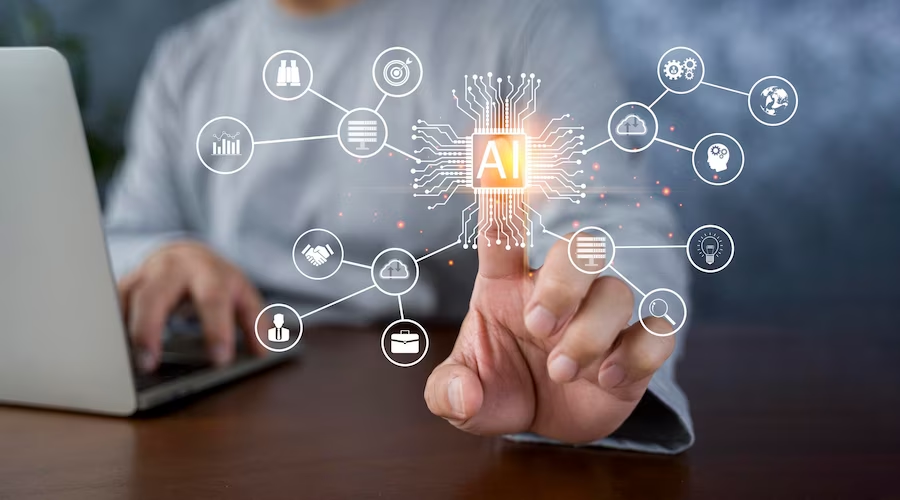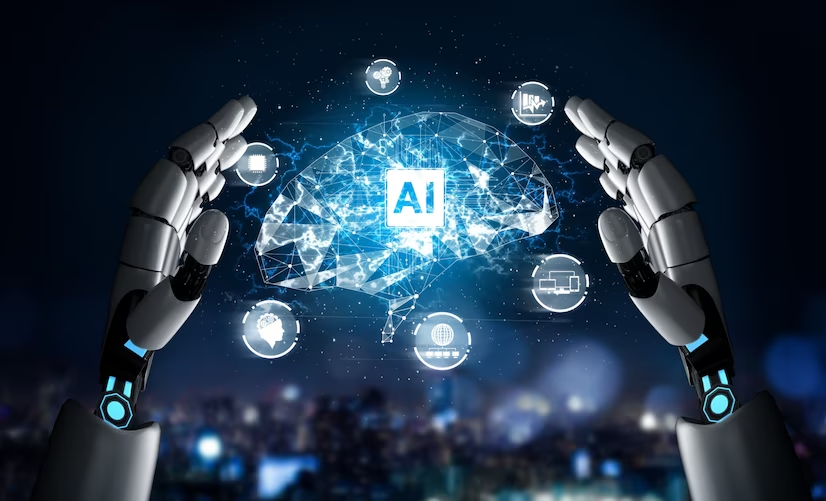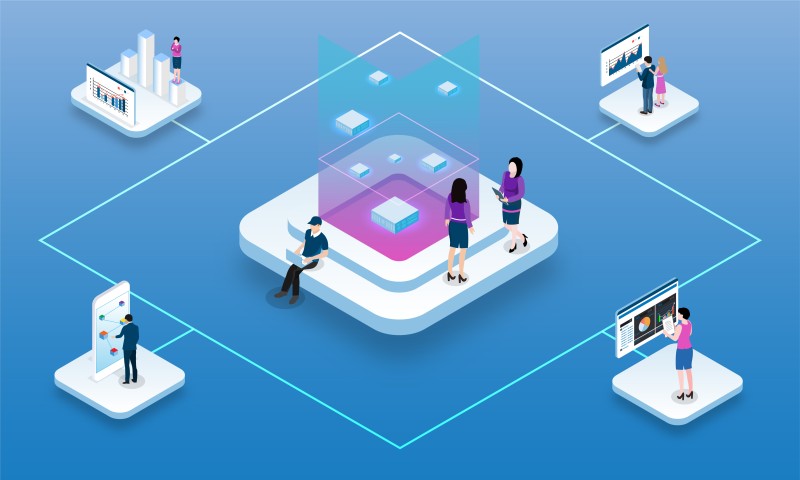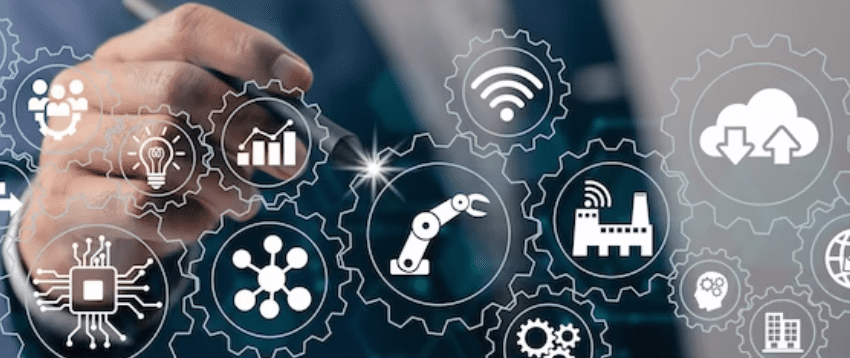Enterprise AI harnesses advanced AI techniques to drive digital transformation.
Artificial intelligence has progressed from general science fiction to a highly trustable reality over the past couple of years.
During this transformational period, IT companies have experienced the transition from mainframe computing to mini-computing, personal computing, and handheld computing.
Software industries saw the transition from custom applications, such as ISAM, VSAM, and MVS, to enterprise applications, SaaS, and mobile applications.
Recently, AI-enabled applications have come into existence. And now, people are getting used to the AI presence in their lives, such as online translators, virtual voice assistants, internet search engines, chatbots, GPS navigators, etc.
From manufacturing and transportation to customer and healthcare service, enterprise AI is maturing in multiple industries.
In this article, I’ll discuss enterprise AI, how it works, its advantages, limitations, and some platforms.
Here we go!
What Is Enterprise AI?

Since your enterprises are scaling up because of industrial digitization, the adoption of artificial intelligence by enterprises is increasing day by day. Technologies like Big data, Cloud computing, IoT, and more create a perfect environment for AI expansion.
Thus, enterprise AI is a category of enterprise software that pairs machine learning with artificial intelligence in order to optimize your business workflow at scale. Also, it produces data-driven insights for your business in order to guide critical-level decisions.
It is a complicated technology with great scope and potential, and hence, has numerous misconceptions like the solutions are just robots, etc. But this is not exactly true, AI comprises different smart technologies that can analyze, learn, make decisions, conclude, and solve problems easily and conveniently.
Many AI technologies are already in use, such as machine learning, deep learning, swarm intelligence, speech recognition, natural language processing (NLP), and more, by various organizations.
With the help of enterprise AI, decision-makers like managers, executives, and stakeholders use efficiencies and insights from AI and further add human value in order to enhance processes and run their business better.
How Does Enterprise AI Work?
Although the tasks carried out in the enterprises are not automatic, sometimes it requires a certain amount of technology to streamline the processes. The technology used to do so is called intelligence, which is the capacity that acquires knowledge and applies it to get an outcome.

An enterprise AI program mainly focuses on three cognitive skills:
- Learning: AI focuses on acquiring the required data and creating some rules to turn data into actionable information. These rules are known as algorithms. It provides computing systems with instructions from basic to advanced on how to complete a task.
- Reasoning: The reasoning includes AI’s ability to choose the most needed algorithm among the set of rules in order to use it in a particular context.
- Self-correction: In the aspect of self-correction, AI has the ability to tune and enhance a result progressively until it achieves a particular goal.
Using AI, business tools acquire the knowledge needed to create algorithms and choose the most needed algorithms to use in a context. It predicts the outputs of multiple products so that you can make thoughtful decisions in no time.
Thus, from process automation to data-driven decision-making and data privacy, enterprises need AI for their business processes in order to stay on top of the competition.
Uses of Enterprise AI
Enterprise AI solutions leverage the power of data science to process complex amounts of data. Next, they present the data across simple interfaces so that enterprises could use those solutions.

This will help boost employee productivity, optimize all business operations, and reduce costs. However, enterprise AI is used to:
- Maximize sales: AI is very useful in the field of online business, like shopping. Here AI-enhanced recommendation engines use customer preferences, engagement, and browsing history to pin their interest so that AI can curate suggestions.
- Enhance customer service: We all know about smart personal assistants, including Alexa, Cortana, and Siri. Along with these smart assistants, many companies use online customer support, i.e., chatbots.
- Optimize supply chains: AI plays a major role in the field of logistics management. It offers a clear view of an entire supply chain to complete predictive insights so that human data analysts outperform it well.
- Automate tasks: Automating day-to-day tasks can benefit your business growth while freeing time and resources to complete more valuable jobs.
- Fortify cybersecurity: AI applications, such as credit card fraud alerts, email spam filters, etc., inform potential security threats to authorized users. It also traces transaction history and location.
- Upgrade existing products: Using data, computerized systems inspect products in order to detect defects that are unnoticed by the human inspection team. It also collects and ranks customer feedback to inform about the product’s next-gen model in the making.
- Self-driving vehicles: In the modern world, delivering parcels is now contactless. Here AI uses computer vision technology, IoT sensors, and GPS to follow the route. Autonomous vehicles are also used in large warehouses to place products on shelves.
- Predictive maintenance: Manufacturing enterprises depend on various equipment operations. Predictive maintenance solutions ensure the required stability by predicting the failures. It integrates IoT sensors and devices on machines that have AI algorithms to analyze gathered information.
- Enterprise decision management: Enterprise decision-making is now based on AI technologies that aim to automate repetitive data processing within your organization in order to make data-driven decisions.
Enterprise AI Platforms

Enterprise AI platforms are the frameworks that can accelerate the complete lifecycle of Enterprise AI projects at scale. It offers a structured yet flexible way of building AI-based solutions over the long term.
Moreover, an enterprise AI platform lets AI services scale from concept to a production-scale system. With some specific guidelines, AI-driven solutions can enable your business to grow.
In addition, it facilitates more effective, efficient, and faster collaboration among AI engineers and scientists when designed well. With a proper solution, you can manage costs in various ways by automating low-value tasks, avoiding duplication, and improving the reusability and reproducibility of all your work.
If you want to perform some resource-intensive activities, like extracting data, copying data, or managing data quality, AI-driven solutions can help.
Moreover, an enterprise AI platform helps in tackling skills gaps. It is a focal point among new talents and helps support and develop best practices for machine learning engineers and AI scientists.
Lastly, an enterprise AI platform ensures the work is distributed evenly and quickly among the team members. Within this platform, the elements are organized into five layers:
- Experience layer
- Intelligence layer
- Operations and deployment layer
- Experimentation layer
- Data and integration layer
These layers work together to allow the use of recent AI capabilities and set a new stage for incorporating the technology in future projects.
Let’s check out some examples of enterprise AI platforms:
#1. Amazon Sagemaker
Amazon Sagemaker is a managed machine-learning workflow platform and a development environment specially outfitted for enterprise-grade model building, data labeling, tuning, training, and deployment.
#2. Databricks
Databricks describes itself as the data lakehouse that combines the raw repository features of data lakes and the well-maintained analytics character of data warehouses.
#3. H2O Driverless AI
H2O Driverless AI ensures there is no one at the wheel. This means all the typical barriers keeping enterprises from moving forward into machine learning are automated.
#4. Google Cloud Vertex AI
Google Cloud Vertex AI offers a library of pre-trained ML models and a user-friendly interface for productivity at scale by bringing the whole of Google’s cloud services under one roof.
#5. DataRobot
DataRobot turns data into value by offering end-to-end automation for creating, managing, and deploying machine learning models at scale. The goal is to bring key stakeholders on the same page, eliminating the requirement of custom predictive code.
Why Do Enterprises Need AI platforms?

Enterprise AI is a core enabler of current digital transformation. In the coming days, every enterprise software application will be AI-enabled. Organizations today depend upon ERP or CRM systems to run their business.
Later, without the use of enterprise AI capabilities, organizations would not be able to operate and compete for that effect.
To get the transformative value from artificial intelligence, you must deploy the AI applications at scale to address different scenarios across your organization’s complete value chain.
An enterprise AI platform offers capabilities and tools that allow various organizations to address the challenges in operating and building these applications effectively with minimal effort, overhead, and time.
Core Principles of Enterprise AI
The core principles of an enterprise AI platform can be organized in comprehensive and convenient enterprise requirements. Let’s discuss the checklist.
#1. Unify Extraprise and Enterprise Data

In order to process re-engineering activities across your business, you must integrate data from various systems and sensors into a unified data image.
The baseline is to aggregate and process petabyte-scale datasets rapidly that are continuously harvested from multiple IT systems, sensor networks, and internet sources.
#2. Enable Multiple Cloud Deployments
To persist and process large-scale datasets effectively, you require an elastic cloud scale in/out architecture that supports private cloud, public cloud, and hybrid cloud deployments. It is achieved by container technology.
#3. Provide Options for Edge Deployment
An enterprise AI platform enables local processing to support low-latency computing situations or requirements where network bandwidth is intermittent. It has the ability to run AI predictions, analytics, and inferences on the edge and remote gateway devices.
#4. Access Multiple Format Data In-place

AI applications need a set of platform services in order to process data in micro batches, batches, iteratively in memory, and real-time streams across servers to support testing analytic algorithms and features. The architecture supports data virtualization, allowing developers to manipulate data.
#5. Implement Enterprise Object Model
An enterprise AI platform must support an object model that illustrates entities, such as products, customers, and assets. Also, it represents relationships between the entities according to the data stores and formats.
#6. Enable AI Microservices
In order to let developers rapidly build apps that leverage the best components, you need to have a comprehensive catalog of software services based on AI. This catalog of microservices should be available or published enterprise-wide, subject to authorization and security access controls.
#7. Provide Data Security and Governance
An enterprise AI platform provides multiple-level user access authentication, robust encryption, and authorization controls. Access to every data object, aggregate service, ML algorithm, and method is subject to authorization. It needs to be programmatically and dynamically settable.
#8. Support Complete Life-cycle AI Model Development

The AI platform must support the complete lifecycle algorithm development experience in order to help data scientists design, develop, deploy, and test deep learning and ML algorithms rapidly.
#9. Open to Third-party IDEs, Frameworks, and Tools
The ability to operate along with other components, products, and technologies is quite essential to enhance data science and developer productivity. This further enables collaboration and maintains a pace needed for ongoing innovation.
#10. Allow Collaborative AI Application Development
Data scientists generally work in isolation to develop and test ML algorithms against small data subsets provided by IT from multiple source systems. The major time is spent on data normalization and data cleansing in order to represent the same measures, states, entities, and events.
To overcome these boundaries, an enterprise AI platform allows data scientists to build, test, and tune algorithms in the programming languages against the availability of production data. This way, the work is divided among the developers, and work will be completed with ease. As a result, you can deploy ML algorithms in production immediately.
Advantages of Enterprise AI
Nowadays, most companies are looking forward to AI in order to maximize existing operations instead of radically changing their business models. So, let’s discuss some of the benefits of using enterprise AI.
Enhanced Customer Service

AI has the ability to speed up customer service and personalize it across your enterprise. Your employees or customers don’t have to wait much to get their issues resolved in time.
Enhanced Monitoring
With enterprise AI, you can process data in real time. This means organizations can now implement instantaneous monitoring. For example, factory floors use image recognition applications and ML models in processing quality control to monitor flag and production problems.
Better Quality
Companies can expect minimal error and high adherence to compliance standards. AI helps in performing quality tasks that were previously done manually. In the field of financial reconciliation, machine learning has substantially reduced time, errors, and costs.
Faster Product Development
AI enables shorter cycles for development and reduces the time between commercialization and design for a faster ROI of development.
Better Talent Management

Companies are using AI software to streamline their hiring process, boost productivity, and minimize biased corporate communications by screening top-tier candidates. It’s implemented in speech recognition and other tools to give chatbots the ability to offer personalized service to employees and job candidates.
Business Model Expansion
Digital natives, including Airbnb, Uber, Amazon, and others, have used AI to implement new and demanding business models. AI-enabled business models are setting a new era of productivity across organizations to help users achieve better output.
Limitations of Enterprise AI
The major risk of enterprise AI is worker mistrust. Many employees remain unconvinced of its values and fear or distrust AI. Apart from this, there are more limitations to using AI in the enterprise. They are:
- Inflated expectation
- AI errors
- Lack of technical capacity
- Lack of skilled workers
- Regulation and control issues
- High initial costs
- Impact on the labor market
Learning Resources
If you want to learn more about Enterprise AI, here are a few books and courses you can consider:
#1. AI Entrepreneurship Mastery

Udemy is offering a course, “AI Entrepreneurship Mastery 2023,” to help you learn how to build, grow, and expand your business successfully using AI.
#2. The Theory and Practice of Enterprise AI by Ilya Katsov:
This book contains the reference implementations and recipes for production operations, marketing, and supply chain using Enterprise AI.
#3. Enterprise Artificial Intelligence and Machine Learning for Managers:
This book by Nikhil Krishnan is a practical guide to ML and AI for government and businesses.
#4. Enterprise Artificial Intelligence Transformation:
This book by Rashed Haq provides in-depth guidance to business leaders on how to create and grow their AI and ML capabilities.
#5. Enterprise AI for Dummies:
This book by Zachary Jarvinen makes business leaders understand AI and how complicated this world is using examples, prose, and applications.
Conclusion
Enterprise AI is driving digital transformation with its modern techniques. As a result, more and more organizations from different industries are adopting it to boost productivity, customer service, and product quality while saving time and effort.
So, if you are a business owner, you might want to implement Enterprise AI in your organization and experience the benefits yourself.
Si quiere puede hacernos una donación por el trabajo que hacemos, lo apreciaremos mucho.
Direcciones de Billetera:
- BTC: 14xsuQRtT3Abek4zgDWZxJXs9VRdwxyPUS
- USDT: TQmV9FyrcpeaZMro3M1yeEHnNjv7xKZDNe
- BNB: 0x2fdb9034507b6d505d351a6f59d877040d0edb0f
- DOGE: D5SZesmFQGYVkE5trYYLF8hNPBgXgYcmrx
También puede seguirnos en nuestras Redes sociales para mantenerse al tanto de los últimos post de la web:
- Telegram
Disclaimer: En Cryptoshitcompra.com no nos hacemos responsables de ninguna inversión de ningún visitante, nosotros simplemente damos información sobre Tokens, juegos NFT y criptomonedas, no recomendamos inversiones

